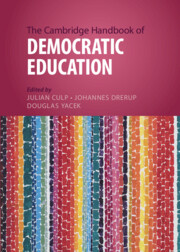Book contents
- The Cambridge Handbook of Democratic Education
- Cambridge Handbooks in Education
- The Cambridge Handbook of Democratic Education
- Copyright page
- Contents
- Contributors
- Acknowledgments
- Introduction
- Part One Historical Perspectives
- Part Two Philosophical and Normative Foundations
- 9 Normative Case Studies as Democratic Education
- 10 Moral Education and Democratic Education
- 11 Rawlsian Political Liberalism and Democratic Education
- 12 Social Justice Education and Democratic Legitimacy
- 13 Critical Theory, Local Moral Perception, and Democratic Education
- 14 Democratic Deliberation in the Absence of Integration
- 15 Education and Democratic Citizenship: Capabilities and Quality Education
- Part Three Key Topics and Concepts
- Part Four Challenges
- Index
- References
15 - Education and Democratic Citizenship: Capabilities and Quality Education
from Part Two - Philosophical and Normative Foundations
Published online by Cambridge University Press: 20 April 2023
- The Cambridge Handbook of Democratic Education
- Cambridge Handbooks in Education
- The Cambridge Handbook of Democratic Education
- Copyright page
- Contents
- Contributors
- Acknowledgments
- Introduction
- Part One Historical Perspectives
- Part Two Philosophical and Normative Foundations
- 9 Normative Case Studies as Democratic Education
- 10 Moral Education and Democratic Education
- 11 Rawlsian Political Liberalism and Democratic Education
- 12 Social Justice Education and Democratic Legitimacy
- 13 Critical Theory, Local Moral Perception, and Democratic Education
- 14 Democratic Deliberation in the Absence of Integration
- 15 Education and Democratic Citizenship: Capabilities and Quality Education
- Part Three Key Topics and Concepts
- Part Four Challenges
- Index
- References
Summary
Public education is crucial to the health of democracy. Recent educational initiatives in many countries, however, focus narrowly on science and technology, neglecting the arts and humanities. They also focus on internalization of information, rather than on the formation of the student’s critical and imaginative capacities. This chapter argues that such a narrow focus is dangerous for democracy’s future. Drawing on the ideas of Rabindranath Tagore, the chapter proposes a three‐part model for the development of young people’s capabilities through education, focusing on critical thinking, world citizenship, and imaginative understanding.
- Type
- Chapter
- Information
- The Cambridge Handbook of Democratic Education , pp. 250 - 260Publisher: Cambridge University PressPrint publication year: 2023



